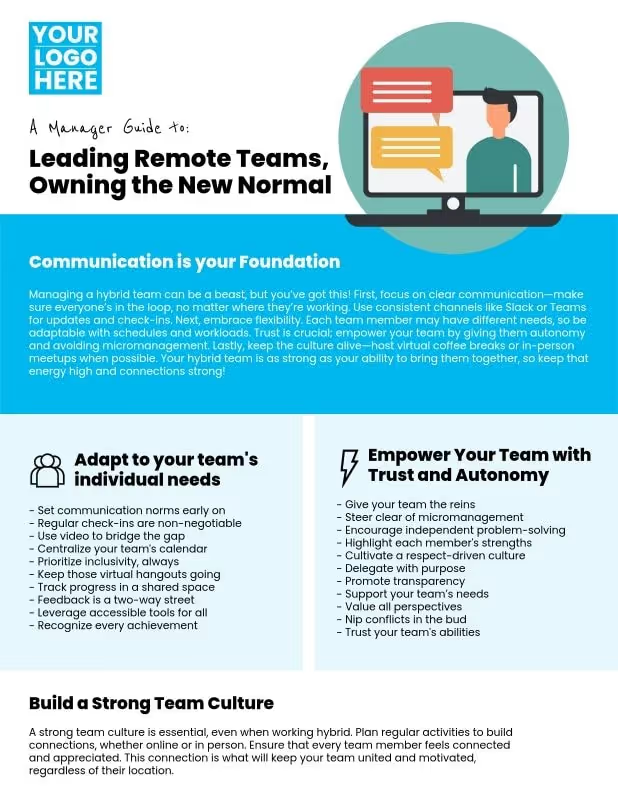Optimize hybrid team management with these thoughtfully crafted templates.
Managing a hybrid team presents unique challenges, from maintaining team cohesion to ensuring productive collaboration across in-office and remote workers. These 16 customizable design and communication templates are here to simplify the process, ensuring your team operates seamlessly. These templates are designed not only to manage day-to-day work but also to link daily responsibilities to broader coaching and development goals. Let’s dive into these resources, categorized into design and communication templates for easy reference.
Visuals play a crucial role in fostering team spirit and professional communication within a hybrid environment. Use these templates to establish consistency and engagement.

Customizable Templates for Effective Performance Reviews
Purpose: Streamline performance reviews with structured and visually engaging formats.
Why It Matters: Helps provide clear feedback while maintaining transparency, fostering growth and trust within your hybrid team.
Hybrid Team Building Activities Guide
Purpose: A collection of design-ready activity templates to facilitate team bonding across remote and in-office staff.
Why It Matters: Promotes a sense of community and trust, crucial for maintaining morale in a hybrid setting. One example of a fun and interactive team-building activity is a virtual escape room, which promotes communication and collaboration among remote participants.
Team-Wide Zoom Backgrounds
Purpose: Branded backgrounds for virtual meetings to represent your organization professionally.
Why It Matters: Encourages uniformity and enhances the virtual experience for remote employees.

Hybrid Work Weekly Planner
Purpose: Designated planners for managing in-office and remote work schedules.
Why It Matters: Helps hybrid teams stay organized and ensures clear visibility of team availability.
Meeting Agenda Template
Purpose: Create visually structured agendas for hybrid meetings.
Why It Matters: Keeps discussions focused and maximizes productivity for both in-office and virtual attendees.
Communication Templates
Communication lies at the heart of effective hybrid team management. These templates ensure clarity, inclusivity, and engagement for all team members. Additionally, these templates help in fostering a strong team culture, promoting unity and collaboration among team members.
1-on-1 Meeting with Manager Template
Purpose: A structured template for productive 1-on-1 discussions.
Why It Matters: Enables managers to address individual concerns and offer tailored support to each team member, boosting employee satisfaction and performance.
Management Tips When You Inherit a New Team
Purpose: A guide offering actionable advice for managers stepping into new leadership roles.
Why It Matters: Helps new leaders build rapport and establish trust with their team quickly.
Managing Remote Teams Checklist
Purpose: A checklist for effectively overseeing remote team members.
Why It Matters: Ensures managers address unique challenges faced by remote employees, fostering inclusion and engagement.
Managing Remote Teams Best Practices Guide
Purpose: A detailed guide on best practices for remote team management.
Why It Matters: Helps leaders create a productive and supportive environment for remote workers.

New Hybrid Employee Welcome Email
Purpose: A warm email template to onboard hybrid employees.
Why It Matters: Sets a positive tone and ensures new hires feel supported from day one.
Team Updates Communication Plan
Purpose: A structured approach to sharing regular team updates.
Why It Matters: Keeps all team members informed, regardless of location, fostering a sense of inclusion.
Weekly Check-In Survey
Purpose: A simple survey to gather feedback from hybrid team members.
Why It Matters: Identifies challenges early and ensures everyone's voice is heard.
Conflict Resolution Email Template
Purpose: A professional template for addressing and resolving team conflicts.
Why It Matters: Maintains a harmonious working environment by addressing issues proactively.
Hybrid Team Collaboration Guidelines
Purpose: Clear guidelines for effective collaboration between remote and in-office employees.
Why It Matters: Prevents misunderstandings and ensures smooth workflows.
Recognition and Rewards Email
Purpose: Celebrate team members' achievements with personalized recognition emails.
Why It Matters: Boosts morale and encourages high performance across the team.
Annual Performance Review Invitation
Purpose: A formal email template for inviting employees to their annual reviews.
Why It Matters: Provides clarity and ensures employees are well-prepared for performance discussions.
Challenges of Managing Remote Teams
Managing remote teams can be challenging due to the unique obstacles that come with it. Some of the common challenges include:
Confusion and Miscommunication
Remote employees can often find themselves confused about processes and expectations, and may hesitate to ask questions. This can lead to miscommunication and misunderstandings, which can negatively impact the team’s productivity and morale. To overcome this challenge, managers should establish clear communication channels and encourage open feedback. Regular check-ins and transparent guidelines can help ensure everyone is on the same page, fostering a more cohesive remote work environment.
Time Zone and Work Style Differences
Remote teams often span multiple time zones and encompass diverse work styles. This requires managers to be flexible with scheduling and accommodating different work preferences. It can be challenging to coordinate meetings and project timelines when team members are spread across the globe. Utilizing project management tools that support asynchronous collaboration can help bridge these gaps. By being mindful of these differences and finding ways to accommodate them, managers can create a more inclusive and efficient remote team.
Loneliness and Burnout

Remote employees can sometimes feel isolated, relying heavily on emails and Slack messages for communication. This isolation can lead to feelings of loneliness and burnout, which can adversely affect the team’s productivity and morale. Managers should prioritize building a sense of community and connection among team members. Regular virtual team building activities, such as virtual escape rooms or online social events, can help foster a sense of belonging. Additionally, frequent check-ins can provide support and ensure that remote employees feel valued and connected.
Managing Remote Employees
Managing remote employees requires a different approach than managing in-person employees. Here are some strategies for managing remote employees:
Onboarding and Training
Onboarding and training remote employees can be particularly challenging, especially when they are new to the team. Managers should establish a comprehensive onboarding process that includes virtual training sessions, clear instructions, and regular check-ins. This will help remote employees feel more connected to the team and confident in their roles.
To ensure a smooth onboarding process, managers can use project management tools to assign tasks and track progress. Scheduling regular virtual meetings to check in with remote employees and provide feedback is also crucial. This helps new hires feel supported and integrated into the team.
In addition to onboarding, ongoing training and development should be a priority. Virtual workshops, webinars, and online courses can help remote employees develop new skills and stay up-to-date with industry trends. By investing in continuous learning, managers can ensure their remote team members remain engaged and productive.
By prioritizing onboarding and training, managers can help remote employees feel more connected to the team and confident in their roles. This will lead to improved productivity, morale, and overall team performance.

Why Use These Templates?
With these 16 hybrid team management templates, you can:
- Foster cohesion and inclusion in your hybrid team.
- Enhance communication across remote and in-office employees. These templates also help in fostering a supportive workplace culture in a remote environment.
- Streamline management tasks to focus on team growth and productivity.
Get Your Toolkit Now!















